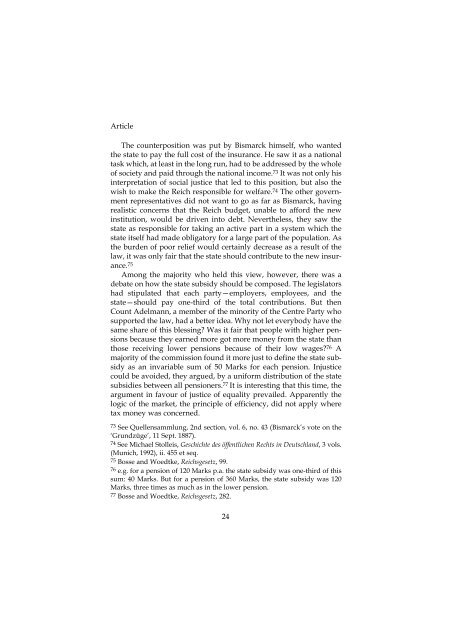Download - German Historical Institute London
Download - German Historical Institute London
Download - German Historical Institute London
You also want an ePaper? Increase the reach of your titles
YUMPU automatically turns print PDFs into web optimized ePapers that Google loves.
Article<br />
The counterposition was put by Bismarck himself, who wanted<br />
the state to pay the full cost of the insurance. He saw it as a national<br />
task which, at least in the long run, had to be addressed by the whole<br />
of society and paid through the national income. 73 It was not only his<br />
interpretation of social justice that led to this position, but also the<br />
wish to make the Reich responsible for welfare. 74 The other government<br />
representatives did not want to go as far as Bismarck, having<br />
realistic concerns that the Reich budget, unable to afford the new<br />
institution, would be driven into debt. Nevertheless, they saw the<br />
state as responsible for taking an active part in a system which the<br />
state itself had made obligatory for a large part of the population. As<br />
the burden of poor relief would certainly decrease as a result of the<br />
law, it was only fair that the state should contribute to the new insurance.<br />
75<br />
Among the majority who held this view, however, there was a<br />
debate on how the state subsidy should be composed. The legislators<br />
had stipulated that each party—employers, employees, and the<br />
state—should pay one-third of the total contributions. But then<br />
Count Adelmann, a member of the minority of the Centre Party who<br />
supported the law, had a better idea. Why not let everybody have the<br />
same share of this blessing? Was it fair that people with higher pensions<br />
because they earned more got more money from the state than<br />
those receiving lower pensions because of their low wages? 76 A<br />
majority of the commission found it more just to define the state subsidy<br />
as an invariable sum of 50 Marks for each pension. Injustice<br />
could be avoided, they argued, by a uniform distribution of the state<br />
subsidies between all pensioners. 77 It is interesting that this time, the<br />
argument in favour of justice of equality prevailed. Apparently the<br />
logic of the market, the principle of efficiency, did not apply where<br />
tax money was concerned.<br />
73 See Quellensammlung, 2nd section, vol. 6, no. 43 (Bismarck’s vote on the<br />
‘Grundzüge’, 11 Sept. 1887).<br />
74 See Michael Stolleis, Geschichte des öffentlichen Rechts in Deutschland, 3 vols.<br />
(Munich, 1992), ii. 455 et seq.<br />
75 Bosse and Woedtke, Reichsgesetz, 99.<br />
76 e.g. for a pension of 120 Marks p.a. the state subsidy was one-third of this<br />
sum: 40 Marks. But for a pension of 360 Marks, the state subsidy was 120<br />
Marks, three times as much as in the lower pension.<br />
77 Bosse and Woedtke, Reichsgesetz, 282.<br />
24













